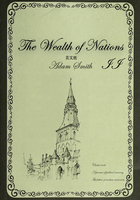'Well, my dear,' says I, 'then I have but one condition more to make with you, and that is, that as there is nobody concerned in it but you and I, you shall not discover it to any person in the world, except your own mother; and that in all the measures you shall take upon the discovery, as I am equally concerned in it with you, though as innocent as yourself, you shall do nothing in a passion, nothing to my prejudice or to your mother's prejudice, without my knowledge and consent.'
This a little amazed him, and he wrote down the words distinctly, but read them over and over before he signed them, hesitating at them several times, and repeating them: 'My mother's prejudice! and your prejudice! What mysterious thing can this be?' However, at last he signed it.
'Well, says I, 'my dear, I'll ask you no more under your hand; but as you are to hear the most unexpected and surprising thing that perhaps ever befell any family in the world, I beg you to promise me you will receive it with composure and a presence of mind suitable to a man of sense.'
'I'll do my utmost,' says he, 'upon condition you will keep me no longer in suspense, for you terrify me with all these preliminaries.'
'Well, then,' says I, 'it is this: as I told you before in a heat, that I was not your lawful wife, and that our children were not legal children, so I must let you know now in calmness and in kindness, but with affliction enough, that I am your own sister, and you my own brother, and that we are both the children of our mother now alive, and in the house, who is convinced of the truth of it, in a manner not to be denied or contradicted.'
I saw him turn pale and look wild; and I said, 'Now remember your promise, and receive it with presence of mind; for who could have said more to prepare you for it than I have done?' However, I called a servant, and got him a little glass of rum (which is the usual dram of that country), for he was just fainting away. When he was a little recovered, I said to him, 'This story, you may be sure, requires a long explanation, and therefore, have patience and compose your mind to hear it out, and I'll make it as short as I can'; and with this, I told him what I thought was needful of the fact, and particularly how my mother came to discover it to me, as above. 'And now, my dear,' says I, 'you will see reason for my capitulations, and that I neither have been the cause of this matter, nor could be so, and that I could know nothing of it before now.'
'I am fully satisfied of that,' says he, 'but 'tis a dreadful surprise to me; however, I know a remedy for it all, and a remedy that shall put an end to your difficulties, without your going to England.' 'That would be strange,' said I, 'as all the rest.' 'No, no,' says he, 'I'll make it easy; there's nobody in the way of it but myself.' He looked a little disordered when he said this, but I did not apprehend anything from it at that time, believing, as it used to be said, that they who do those things never talk of them, or that they who talk of such things never do them.
But things were not come to their height with him, and I observed he became pensive and melancholy; and in a word, as I thought, a little distempered in his head. I endeavoured to talk him into temper, and to reason him into a kind of scheme for our government in the affair, and sometimes he would be well, and talk with some courage about it; but the weight of it lay too heavy upon his thoughts, and, in short, it went so far that he made attempts upon himself, and in one of them had actually strangled himself and had not his mother come into the room in the very moment, he had died; but with the help of a Negro servant she cut him down and recovered him.
Things were now come to a lamentable height in the family. My pity for him now began to revive that affection which at first I really had for him, and I endeavoured sincerely, by all the kind carriage I could, to make up the breach; but, in short, it had gotten too great a head, it preyed upon his spirits, and it threw him into a long, lingering consumption, though it happened not to be mortal. In this distress I did not know what to do, as his life was apparently declining, and I might perhaps have married again there, very much to my advantage; it had been certainly my business to have stayed in the country, but my mind was restless too, and uneasy; I hankered after coming to England, and nothing would satisfy me without it.
In short, by an unwearied importunity, my husband, who was apparently decaying, as I observed, was at last prevailed with; and so my own fate pushing me on, the way was made clear for me, and my mother concurring, I obtained a very good cargo for my coming to England.
When I parted with my brother (for such I am now to call him), we agreed that after I arrived he should pretend to have an account that I was dead in England, and so might marry again when he would. He promised, and engaged to me to correspond with me as a sister, and to assist and support me as long as I lived; and that if he died before me, he would leave sufficient to his mother to take care of me still, in the name of a sister, and he was in some respects careful of me, when he heard of me; but it was so oddly managed that I felt the disappointments very sensibly afterwards, as you shall hear in its time.
I came away for England in the month of August, after I had been eight years in that country; and now a new scene of misfortunes attended me, which perhaps few women have gone through the life of.
We had an indifferent good voyage till we came just upon the coast of England, and where we arrived in two-and-thirty days, but were then ruffled with two or three storms, one of which drove us away to the coast of Ireland, and we put in at Kinsdale. We remained there about thirteen days, got some refreshment on shore, and put to sea again, though we met with very bad weather again, in which the ship sprung her mainmast, as they called it, for I knew not what they meant. But we got at last into Milford Haven, in Wales, where, though it was remote from our port, yet having my foot safe upon the firm ground of my native country, the isle of Britain, I resolved to venture it no more upon the waters, which had been so terrible to me; so getting my clothes and money on shore, with my bills of loading and other papers, I resolved to come for London, and leave the ship to get to her port as she could; the port whither she was bound was to Bristol, where my brother's chief correspondent lived.
I got to London in about three weeks, where I heard a little while after that the ship was arrived in Bristol, but at the same time had the misfortune to know that by the violent weather she had been in, and the breaking of her mainmast, she had great damage on board, and that a great part of her cargo was spoiled.
I had now a new scene of life upon my hands, and a dreadful appearance it had. I was come away with a kind of final farewell. What I brought with me was indeed considerable, had it come safe, and by the help of it, I might have married again tolerably well; but as it was, I was reduced to between two or three hundred pounds in the whole, and this without any hope of recruit. I was entirely without friends, nay, even so much as without acquaintance, for I found it was absolutely necessary not to revive former acquaintances; and as for my subtle friend that set me up formerly for a fortune, she was dead, and her husband also; as I was informed, upon sending a person unknown to inquire.
The looking after my cargo of goods soon after obliged me to take a journey to Bristol, and during my attendance upon that affair I took the diversion of going to the Bath, for as I was still far from being old, so my humour, which was always gay, continued so to an extreme; and being now, as it were, a woman of fortune though I was a woman without a fortune, I expected something or other might happen in my way that might mend my circumstances, as had been my case before.
The Bath is a place of gallantry enough; expensive, and full of snares. I went thither, indeed, in the view of taking anything that might offer, but I must do myself justice, as to protest I knew nothing amiss; I meant nothing but in an honest way, nor had I any thoughts about me at first that looked the way which afterwards I suffered them to be guided.
Here I stayed the whole latter season, as it is called there, and contracted some unhappy acquaintances, which rather prompted the follies I fell afterwards into than fortified me against them. I lived pleasantly enough, kept good company, that is to say, gay, fine company; but had the discouragement to find this way of living sunk me exceedingly, and that as I had no settled income, so spending upon the main stock was but a certain kind of bleeding to death; and this gave me many sad reflections in the interval of my other thoughts. However, I shook them off, and still flattered myself that something or other might offer for my advantage.
But I was in the wrong place for it. I was not now at Redriff, where, if I had set myself tolerably up, some honest sea captain or other might have talked with me upon the honourable terms of matrimony; but I was at the Bath, where men find a mistress sometimes, but very rarely look for a wife; and consequently all the particular acquaintances a woman can expect to make there must have some tendency that way.
I had spent the first season well enough; for though I had contracted some acquaintance with a gentleman who came to the Bath for his diversion, yet I had entered into no felonious treaty, as it might be called. I had resisted some casual offers of gallantry, and had managed that way well enough. I was not wicked enough to come into the crime for the mere vice of it, and I had no extraordinary offers made me that tempted me with the main thing which I wanted.
However, I went this length the first season, viz. I contracted an acquaintance with a woman in whose house I lodged, who, though she did not keep an ill house, as we call it, yet had none of the best principles in herself. I had on all occasions behaved myself so well as not to get the least slur upon my reputation on any account whatever, and all the men that I had conversed with were of so good reputation that I had not given the least reflection by conversing with them; nor did any of them seem to think there was room for a wicked correspondence, if they had any of them offered it; yet there was one gentleman, as above, who always singled me out for the diversion of my company, as he called it, which, as he was pleased to say, was very agreeable to him, but at that time there was no more in it.
I had many melancholy hours at the Bath after the company was gone; for though I went to Bristol sometime for the disposing my effects, and for recruits of money, yet I chose to come back to Bath for my residence, because being on good terms with the woman in whose house I lodged in the summer, I found that during the winter I lived rather cheaper there than I could do anywhere else. Here, I say, I passed the winter as heavily as I had passed the autumn cheerfully; but having contracted a nearer intimacy with the said woman in whose house I lodged, I could not avoid communicating to her something of what lay hardest upon my mind and particularly the narrowness of my circumstances, and the loss of my fortune by the damage of my goods at sea. I told her also, that I had a mother and a brother in Virginia in good circumstances; and as I had really written back to my mother in particular to represent my condition, and the great loss I had received, which indeed came to almost #500, so I did not fail to let my new friend know that I expected a supply from thence, and so indeed I did; and as the ships went from Bristol to York River, in Virginia, and back again generally in less time from London, and that my brother corresponded chiefly at Bristol, I thought it was much better for me to wait here for my returns than to go to London, where also I had not the least acquaintance.
My new friend appeared sensibly affected with my condition, and indeed was so very kind as to reduce the rate of my living with her to so low a price during the winter, that she convinced me she got nothing by me; and as for lodging, during the winter I paid nothing at all.
When the spring season came on, she continued to be as kind to me as she could, and I lodged with her for a time, till it was found necessary to do otherwise. She had some persons of character that frequently lodged in her house, and in particular the gentleman who, as I said, singled me out for his companion the winter before; and he came down again with another gentleman in his company and two servants, and lodged in the same house. I suspected that my landlady had invited him thither, letting him know that I was still with her; but she denied it, and protested to me that she did not, and he said the same.
In a word, this gentleman came down and continued to single me out for his peculiar confidence as well as conversation. He was a complete gentleman, that must be confessed, and his company was very agreeable to me, as mine, if I might believe him, was to him. He made no professions to be but of an extraordinary respect, and he had such an opinion of my virtue, that, as he often professed, he believed if he should offer anything else, I should reject him with contempt. He soon understood from me that I was a widow; that I had arrived at Bristol from Virginia by the last ships; and that I waited at Bath till the next Virginia fleet should arrive, by which I expected considerable effects. I understood by him, and by others of him, that he had a wife, but that the lady was distempered in her head, and was under the conduct of her own relations, which he consented to, to avoid any reflections that might (as was not unusual in such cases) be cast on him for mismanaging her cure; and in the meantime he came to the Bath to divert his thoughts from the disturbance of such a melancholy circumstance as that was.
My landlady, who of her own accord encouraged the correspondence on all occasions, gave me an advantageous character of him, as a man of honour and of virtue, as well as of great estate. And indeed I had a great deal of reason to say so of him too; for though we lodged both on a floor, and he had frequently come into my chamber, even when I was in bed, and I also into his when he was in bed, yet he never offered anything to me further than a kiss, or so much as solicited me to anything till long after, as you shall hear.
I frequently took notice to my landlady of his exceeding modesty, and she again used to tell me, she believed it was so from the beginning; however, she used to tell me that she thought I ought to expect some gratification from him for my company, for indeed he did, as it were, engross me, and I was seldom from him. I told her I had not given him the least occasion to think I wanted it, or that I would accept of it from him. She told me she would take that part upon her, and she did so, and managed it so dexterously, that the first time we were together alone, after she had talked with him, he began to inquire a little into my circumstances, as how I had subsisted myself since I came on shore, and whether I did not want money. I stood off very boldly. I told him that though my cargo of tobacco was damaged, yet that it was not quite lost; that the merchant I had been consigned to had so honestly managed for me that I had not wanted, and that I hoped, with frugal management, I should make it hold out till more would come, which I expected by the next fleet; that in the meantime I had retrenched my expenses, and whereas I kept a maid last season, now I lived without; and whereas I had a chamber and a dining-room then on the first floor, as he knew, I now had but one room, two pair of stairs, and the like. 'But I live,' said I, 'as well satisfied now as I did then'; adding, that his company had been a means to make me live much more cheerfully than otherwise I should have done, for which I was much obliged to him; and so I put off all room for any offer for the present. However, it was not long before he attacked me again, and told me he found that I was backward to trust him with the secret of my circumstances, which he was sorry for; assuring me that he inquired into it with no design to satisfy his own curiosity, but merely to assist me, if there was any occasion; but since I would not own myself to stand in need of any assistance, he had but one thing more to desire of me, and that was, that I would promise him that when I was any way straitened, or like to be so, I would frankly tell him of it, and that I would make use of him with the same freedom that he made the offer; adding, that I should always find I had a true friend, though perhaps I was afraid to trust him.
I omitted nothing that was fit to be said by one infinitely obliged, to let him know that I had a due sense of his kindness; and indeed from that time I did not appear so much reserved to him as I had done before, though still within the bounds of the strictest virtue on both sides; but how free soever our conversation was, I could not arrive to that sort of freedom which he desired, viz. to tell him I wanted money, though I was secretly very glad of his offer.
Some weeks passed after this, and still I never asked him for money; when my landlady, a cunning creature, who had often pressed me to it, but found that I could not do it, makes a story of her own inventing, and comes in bluntly to me when we were together. 'Oh, widow!' says she, 'I have bad news to tell you this morning.' 'What is that?' said I; 'are the Virginia ships taken by the French?'-for that was my fear. 'No, no,' says she, 'but the man you sent to Bristol yesterday for money is come back, and says he has brought none.'
Now I could by no means like her project; I though it looked too much like prompting him, which indeed he did not want, and I clearly saw that I should lose nothing by being backward to ask, so I took her up short. 'I can't image why he should say so to you,' said I, 'for I assure you he brought me all the money I sent him for, and here it is,' said I (pulling out my purse with about twelve guineas in it); and added, 'I intend you shall have most of it by and by.'
He seemed distasted a little at her talking as she did at first, as well as I, taking it, as I fancied he would, as something forward of her; but when he saw me give such an answer, he came immediately to himself again. The next morning we talked of it again, when I found he was fully satisfied, and, smiling, said he hoped I would not want money and not tell him of it, and that I had promised him otherwise. I told him I had been very much dissatisfied at my landlady's talking so publicly the day before of what she had nothing to do with; but I supposed she wanted what I owed her, which was about eight guineas, which I had resolved to give her, and had accordingly given it her the same night she talked so foolishly.
He was in a might good humour when he heard me say I had paid her, and it went off into some other discourse at that time. But the next morning, he having heard me up about my room before him, he called to me, and I answering, he asked me to come into his chamber. He was in bed when I came in, and he made me come and sit down on his bedside, for he said he had something to say to me which was of some moment. After some very kind expressions, he asked me if I would be very honest to him, and give a sincere answer to one thing he would desire of me. After some little cavil at the word 'sincere,' and asking him if I had ever given him any answers which were not sincere, I promised him I would. Why, then, his request was, he said, to let him see my purse. I immediately put my hand into my pocket, and, laughing to him, pulled it out, and there was in it three guineas and a half. Then he asked me if there was all the money I had. I told him No, laughing again, not by a great deal.
Well, then, he said, he would have me promise to go and fetch him all the money I had, every farthing. I told him I would, and I went into my chamber and fetched him a little private drawer, where I had about six guineas more, and some silver, and threw it all down upon the bed, and told him there was all my wealth, honestly to a shilling. He looked a little at it, but did not tell it, and huddled it all into the drawer again, and then reaching his pocket, pulled out a key, and bade me open a little walnut-tree box he had upon the table, and bring him such a drawer, which I did. In which drawer there was a great deal of money in gold, I believe near two hundred guineas, but I knew not how much. He took the drawer, and taking my hand, made me put it in and take a whole handful. I was backward at that, but he held my hand hard in his hand, and put it into the drawer, and made me take out as many guineas almost as I could well take up at once.
When I had done so, he made me put them into my lap, and took my little drawer, and poured out all my money among his, and bade me get me gone, and carry it all home into my own chamber.















